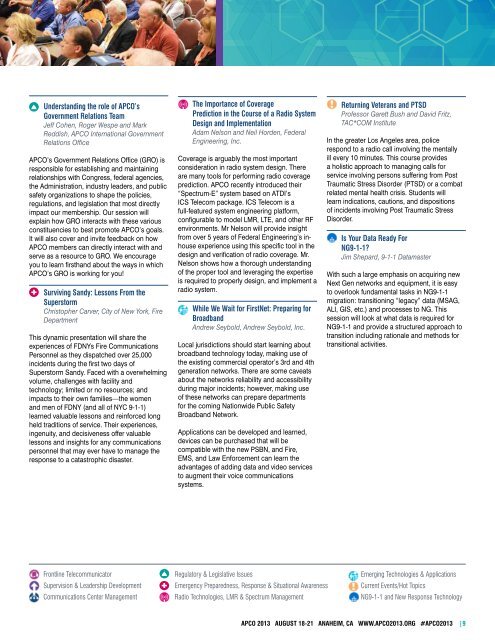Attendee Brochure - APCO 2013
Attendee Brochure - APCO 2013
Attendee Brochure - APCO 2013
You also want an ePaper? Increase the reach of your titles
YUMPU automatically turns print PDFs into web optimized ePapers that Google loves.
Understanding the role of <strong>APCO</strong>’s<br />
Government Relations Team<br />
Jeff Cohen, Roger Wespe and Mark<br />
Reddish, <strong>APCO</strong> International Government<br />
Relations Office<br />
<strong>APCO</strong>’s Government Relations Office (GRO) is<br />
responsible for establishing and maintaining<br />
relationships with Congress, federal agencies,<br />
the Administration, industry leaders, and public<br />
safety organizations to shape the policies,<br />
regulations, and legislation that most directly<br />
impact our membership. Our session will<br />
explain how GRO interacts with these various<br />
constituencies to best promote <strong>APCO</strong>’s goals.<br />
It will also cover and invite feedback on how<br />
<strong>APCO</strong> members can directly interact with and<br />
serve as a resource to GRO. We encourage<br />
you to learn firsthand about the ways in which<br />
<strong>APCO</strong>’s GRO is working for you!<br />
Surviving Sandy: Lessons From the<br />
Superstorm<br />
Christopher Carver, City of New York, Fire<br />
Department<br />
This dynamic presentation will share the<br />
experiences of FDNYs Fire Communications<br />
Personnel as they dispatched over 25,000<br />
incidents during the first two days of<br />
Superstorm Sandy. Faced with a overwhelming<br />
volume, challenges with facility and<br />
technology; limited or no resources; and<br />
impacts to their own families—the women<br />
and men of FDNY (and all of NYC 9-1-1)<br />
learned valuable lessons and reinforced long<br />
held traditions of service. Their experiences,<br />
ingenuity, and decisiveness offer valuable<br />
lessons and insights for any communications<br />
personnel that may ever have to manage the<br />
response to a catastrophic disaster.<br />
The Importance of Coverage<br />
Prediction in the Course of a Radio System<br />
Design and Implementation<br />
Adam Nelson and Neil Horden, Federal<br />
Engineering, Inc.<br />
Coverage is arguably the most important<br />
consideration in radio system design. There<br />
are many tools for performing radio coverage<br />
prediction. <strong>APCO</strong> recently introduced their<br />
“Spectrum-E” system based on ATDI’s<br />
ICS Telecom package. ICS Telecom is a<br />
full-featured system engineering platform,<br />
configurable to model LMR, LTE, and other RF<br />
environments. Mr Nelson will provide insight<br />
from over 5 years of Federal Engineering’s inhouse<br />
experience using this specific tool in the<br />
design and verification of radio coverage. Mr.<br />
Nelson shows how a thorough understanding<br />
of the proper tool and leveraging the expertise<br />
is required to properly design, and implement a<br />
radio system.<br />
While We Wait for FirstNet: Preparing for<br />
Broadband<br />
Andrew Seybold, Andrew Seybold, Inc.<br />
Local jurisdictions should start learning about<br />
broadband technology today, making use of<br />
the existing commercial operator’s 3rd and 4th<br />
generation networks. There are some caveats<br />
about the networks reliability and accessibility<br />
during major incidents; however, making use<br />
of these networks can prepare departments<br />
for the coming Nationwide Public Safety<br />
Broadband Network.<br />
Applications can be developed and learned,<br />
devices can be purchased that will be<br />
compatible with the new PSBN, and Fire,<br />
EMS, and Law Enforcement can learn the<br />
advantages of adding data and video services<br />
to augment their voice communications<br />
systems.<br />
Returning Veterans and PTSD<br />
Professor Garett Bush and David Fritz,<br />
TAC*COM Institute<br />
In the greater Los Angeles area, police<br />
respond to a radio call involving the mentally<br />
ill every 10 minutes. This course provides<br />
a holistic approach to managing calls for<br />
service involving persons suffering from Post<br />
Traumatic Stress Disorder (PTSD) or a combat<br />
related mental health crisis. Students will<br />
learn indications, cautions, and dispositions<br />
of incidents involving Post Traumatic Stress<br />
Disorder.<br />
Is Your Data Ready For<br />
NG9-1-1?<br />
Jim Shepard, 9-1-1 Datamaster<br />
With such a large emphasis on acquiring new<br />
Next Gen networks and equipment, it is easy<br />
to overlook fundamental tasks in NG9-1-1<br />
migration: transitioning “legacy” data (MSAG,<br />
ALI, GIS, etc.) and processes to NG. This<br />
session will look at what data is required for<br />
NG9-1-1 and provide a structured approach to<br />
transition including rationale and methods for<br />
transitional activities.<br />
Frontline Telecommunicator<br />
Supervision & Leadership Development<br />
Communications Center Management<br />
Regulatory & Legislative Issues<br />
Emergency Preparedness, Response & Situational Awareness<br />
Radio Technologies, LMR & Spectrum Management<br />
Emerging Technologies & Applications<br />
Current Events/Hot Topics<br />
NG9-1-1 and New Response Technology<br />
<strong>APCO</strong> <strong>2013</strong> AUGUST 18-21 ANAHEIM, CA WWW.<strong>APCO</strong><strong>2013</strong>.ORG #<strong>APCO</strong><strong>2013</strong> |9


